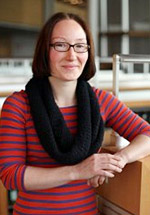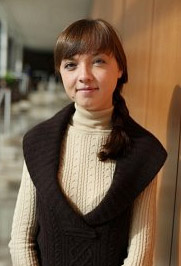International education exchanges are at all-time high, strengthening economies and societies around the world. During the 2011-2012 academic year, Penn State ranked 12th in the nation for its international student enrollment with a total of 6,075 international students enrolled at University Park. We caught up with a few international students in the LL.M. program who shared their impressions about Penn State Law. Perhaps not so surprising, diversity of the student population was a common theme among their positive experiences.
Once-in-a-lifetime experience

Katharina von Smirnow
expected many things when she joined Penn State Law’s LL.M. program. Penn State has a strong reputation in Germany and von Smirnow’s employer was very impressed that she had been accepted into the LL.M. program. “The classes are great but I expected that. What I did not expect is that Penn State attracts so many people from all over the world. They all come here together, with different backgrounds and different experiences,” she said. “They are all willing to share their opinions, their thoughts, and their dreams. I’ve never had this type of experience before and I don’t think I will ever have it again.”
When she graduated from her LL.B. program at
Albert-Ludwigs-Universität in Freiburg, Germany, a difficult economy made finding employment challenging. “I always had getting an LL.M. degree in the back of my mind,” she said. After being told by several employers that if she had an LL.M. she would “be perfect,” her decision was made. A multi-disciplinary professional services firm hired her on the condition that she complete her LL.M. She worked for the firm in both Germany and Latvia from January to July and plans to return after she graduates.
Von Smirnow said she loves business law which is which is one of the reasons she decided to attend Penn State. “There are so many different perspectives where people are coming together to try to achieve one goal,” she said. She especially hopes to develop her expertise in contracts. “Rather than end up in court, I hope I can help solve problems before they arise,” she said. She said her favorite class is Antitrust describing Professor
John Lopatka as “not just a leading antitrust scholar but a unique character. When he enters the room, everyone stops talking and listens. It’s a gift and is inspiring to me to be part of it,” she said.
This is not von Smirnow’s first experience living in the United States. As part of a high school exchange program she lived with a family near Rochester, New York and considers them her American family. She is able to get advice from her American family, her law professors, and her three roommates who are also studying law. The most difficult part of law school is the reading. “It is nothing like my program in Germany which was more focused on systematic and methodological aspects of the law,” she said. Though she is at the Law School from 9 a.m. to 8 p.m. most days, she continues to practice gymnastics, her passion since the age of 5.
Professional atmosphere

Hayati Irkicatal,
who’s in his third year of undergraduate law study at the
Cankaya University, is simultaneously working on earning his LL.M. degree at Penn State Law. For the past six years, Irkicatal has worked as an energy expert at the Republic of Turkey
Energy Market Regulatory Authority with a specialization in natural gas distribution companies and some natural gas trade and capacity trading.
Although primarily interested in commercial arbitration, Irkicatal is also interested in domestic arbitration. “We have lots of big arbitration cases and most of them are in the area of energy. I plan to work as an arbitrator in my home country of Turkey. I chose Penn State Law because of its good ranking and renowned scholars in the field of arbitration law,” Irkicatal said. He is currently taking U.S. Law of Arbitration with
Professor Thomas Carbonneau and International Commercial Arbitration with
Professor Catherine Rogers. He is also a research assistant for Professor Rogers. “Mr. Irkicatal brings to class discussion an interesting real world perspective from the critical natural gas sector in Turkey. He has also been helping with research on my book on ethics in international arbitration, most particularly by providing analysis of Turkish arbitration law and practice sources that are otherwise difficult to research,” Rogers said.
“I’ve studied at five different universities since 1996 and the most distinctive characteristic that distinguishes Penn State Law from other schools is the professors’ attitude toward students. They see and treat us like colleagues. They helped me to form my schedule and gave me lots of insights about the courses I should take and things I should do to achieve my goals for my future career. That’s why I like Penn State Law.
Open door policy

After graduating from
Lazarski University of Law and Economy with a master’s degree in law in 2008, LL.M. student Sylwia Osiecka
moved permanently from Warsaw, Poland to join her parents in Evergreen, Colorado. When she couldn’t easily find a job utilizing her law degree, Osiecka applied to and was hired by a local bank. “As with any bank, I started first as a teller. Then after 4 years, I became a supervisor and was assisting officer and was handling loan documents.” Pleased with her work, the bank manager told Osiecka that she had the potential to become an officer at the bank but she would have to earn a business degree. “At that point, I thought if I have to go back to school, I am going to go back for something I love and really want to do!” Osiecka said. So, she applied to and was accepted into the LL.M. program.
“I chose Penn State Law because of its reputation and curriculum. It’s great from my stand point because I hope to pursue a career in mediation and arbitration. My final thesis was on mediation and arbitration which was just developing in Poland during my study at Lazarski so I did a comparative study between U.S. and Polish law. I will be able to take all the mediation and arbitration classes I need at Penn State Law.” Osiecka hopes to transfer to the J.D. program and eventually sit for the Colorado bar exam.
“One of my favorite parts about Penn State Law is the accessibility to the professors. Even when their office doors might be ‘technically closed,’ they are always open for you. That is something completely new for me, and it’s great! In Poland, professors come in, give a lecture, and meet you at the exam. That’s it. There is no outside contact at all. Whereas here, even if you don’t have a class with a professor, you can just knock on their doors and say ‘I am really interested in what you do’ and they are willing to talk with you. That’s the part that I just love!”
Osiecka also enjoys the diverse international student environment. “There are so many international students here that you won’t feel out of place. You will definitely find someone here who is from your home country or speaks your native language. Just within the Law School population, I met a J.D. student originally from Poland.”
 Katharina von Smirnow expected many things when she joined Penn State Law’s LL.M. program. Penn State has a strong reputation in Germany and von Smirnow’s employer was very impressed that she had been accepted into the LL.M. program. “The classes are great but I expected that. What I did not expect is that Penn State attracts so many people from all over the world. They all come here together, with different backgrounds and different experiences,” she said. “They are all willing to share their opinions, their thoughts, and their dreams. I’ve never had this type of experience before and I don’t think I will ever have it again.”
Katharina von Smirnow expected many things when she joined Penn State Law’s LL.M. program. Penn State has a strong reputation in Germany and von Smirnow’s employer was very impressed that she had been accepted into the LL.M. program. “The classes are great but I expected that. What I did not expect is that Penn State attracts so many people from all over the world. They all come here together, with different backgrounds and different experiences,” she said. “They are all willing to share their opinions, their thoughts, and their dreams. I’ve never had this type of experience before and I don’t think I will ever have it again.” Hayati Irkicatal, who’s in his third year of undergraduate law study at the Cankaya University, is simultaneously working on earning his LL.M. degree at Penn State Law. For the past six years, Irkicatal has worked as an energy expert at the Republic of Turkey Energy Market Regulatory Authority with a specialization in natural gas distribution companies and some natural gas trade and capacity trading.
Hayati Irkicatal, who’s in his third year of undergraduate law study at the Cankaya University, is simultaneously working on earning his LL.M. degree at Penn State Law. For the past six years, Irkicatal has worked as an energy expert at the Republic of Turkey Energy Market Regulatory Authority with a specialization in natural gas distribution companies and some natural gas trade and capacity trading. After graduating from Lazarski University of Law and Economy with a master’s degree in law in 2008, LL.M. student Sylwia Osiecka moved permanently from Warsaw, Poland to join her parents in Evergreen, Colorado. When she couldn’t easily find a job utilizing her law degree, Osiecka applied to and was hired by a local bank. “As with any bank, I started first as a teller. Then after 4 years, I became a supervisor and was assisting officer and was handling loan documents.” Pleased with her work, the bank manager told Osiecka that she had the potential to become an officer at the bank but she would have to earn a business degree. “At that point, I thought if I have to go back to school, I am going to go back for something I love and really want to do!” Osiecka said. So, she applied to and was accepted into the LL.M. program.
After graduating from Lazarski University of Law and Economy with a master’s degree in law in 2008, LL.M. student Sylwia Osiecka moved permanently from Warsaw, Poland to join her parents in Evergreen, Colorado. When she couldn’t easily find a job utilizing her law degree, Osiecka applied to and was hired by a local bank. “As with any bank, I started first as a teller. Then after 4 years, I became a supervisor and was assisting officer and was handling loan documents.” Pleased with her work, the bank manager told Osiecka that she had the potential to become an officer at the bank but she would have to earn a business degree. “At that point, I thought if I have to go back to school, I am going to go back for something I love and really want to do!” Osiecka said. So, she applied to and was accepted into the LL.M. program.